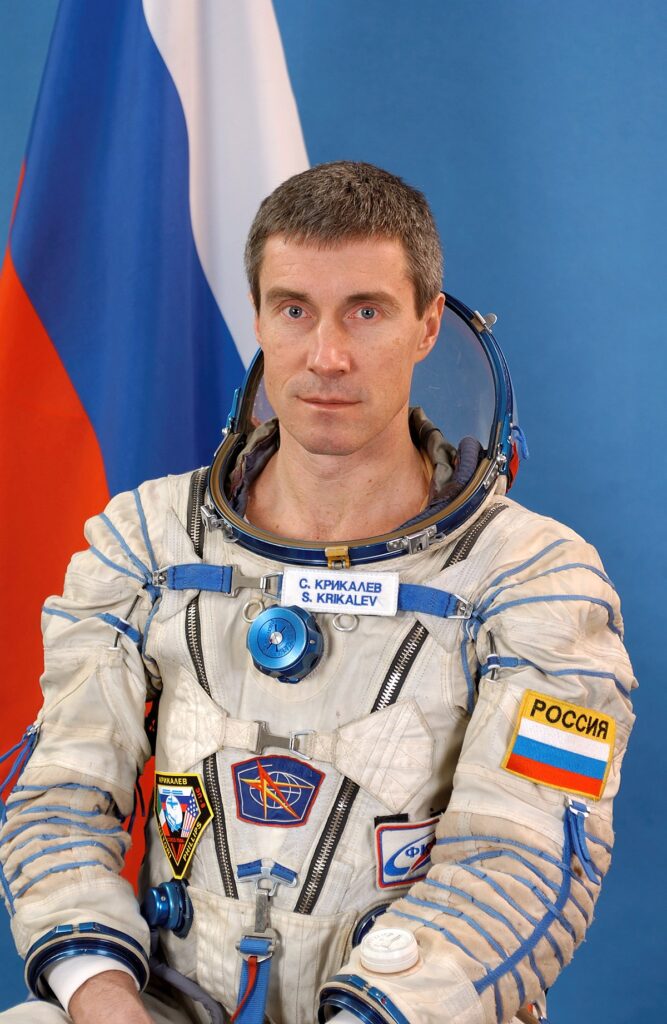Sergei Konstantinovich Krikalev was born on August 27, 1958, in Leningrad, USSR (now St. Petersburg, Russia). He graduated from high school in 1975, and in 1981 received a mechanical engineering degree from the Leningrad Mechanical Institute, now the St. Petersburg Technical University. Although his mother wanted him to become a doctor, Sergei had been interested in becoming a cosmonaut since he was a small boy and was determined to pursue his dream.
After graduating from the university he joined NPO Energia, the Soviet industrial organization responsible for manned space flight activities. He tested space flight equipment, developed space operations methods, and participated in ground control operations. When the Salyut 7 space station failed in 1985, he worked on the rescue mission team, developing procedures for docking with the uncontrolled station and repairing the station’s onboard system.
Krikalev was selected as a cosmonaut in 1985, completed his basic training in 1986, and was assigned to the Buran program, the USSR’s space shuttle (which was canceled in 1993). In early 1988, he began training for his first long-duration flight aboard the Mir space station. Soyuz TM-7 was launched on November 26, 1988, with Krikalev as Flight Engineer, Alexander Volkov as Commander, and French astronaut Jean-Loup Chretien. They replaced the previous Mir crew of Vladimir Titov, Musa Manarov, and Valeri Polyakov. Krikalev spent the next 152 days aboard Mir, returning safely to Earth on April 27, 1989.
On May 18, 1991, Sergei Krikalev returned to Mir as part of the Mir EO-9 crew, along with Anatoli Artsebarski, and Britain’s first astronaut, Helen Sharman. He remained on Mir more than 311 days returning to Earth on March 25, 1992. During that time the Soviet Union collapsed and a new Russia was born. For this Krikalev is sometimes called “the last Soviet citizen.”
In October 1992, NASA announced that an experienced cosmonaut would fly aboard a future Space Shuttle mission. Krikalev was one of two candidates named by the Russian Space Agency for mission specialist training with the crew of STS-60 and in April 1993, he was assigned as a prime mission specialist.
Sergei Krikalev was aboard STS-60 Discovery, the first joint U.S./Russian Space Shuttle Mission. Launched on February 3, 1994, from Kennedy Space Center (KSC), Florida, STS-60 was the second flight of the Space Habitation Module-2 (Spacehab-2), and the first flight of the Wake Shield Facility (WSF-1). During the flight, the crew of Discovery conducted a wide variety of materials science experiments, both on the WSF-1 and in the Spacehab, as well as earth observation, and life science experiments. Krikalev conducted significant portions of the Remote Manipulator System (RMS) operations during the flight. After 130 orbits of the Earth in 3,439,705 miles, STS-60 landed at KSC on February 11, 1994.
Krikalev returned to duty in Russia but periodically traveled to the Johnson Space Center in Houston to work with NASA Mission Control and ground controllers in Russia supporting joint U.S./Russian shuttle missions, including STS-63, STS-71, STS-74, and STS-76.
Sergei Krikalev’s next space mission was STS-88 Endeavour, launched from KSC on December 4, 1998. This was the first International Space Station (ISS) assembly mission. While in orbit, the crew joined the Unity module of the ISS with the Zarya module. Krikalev and others performed three spacewalks to connect umbilicals and attach tools and hardware for use in future EVA’s. The crew also performed IMAX Cargo Bay Camera operations and deployed two satellites. The mission was ended on December 15, with a night landing at KSC after 185 orbits of the Earth in 283 hours and 18 minutes.
Krikalev’s next assignment was living and working aboard the ISS as part of the Expedition-1 crew, the first to actually occupy the station. Mission Commander William Shepherd, Flight Engineer Krikalev and Soyuz Commander Yuri Gidzenko were launched October 31, 2000, on a Soyuz rocket from Baikanor, Kazakhstan, and successfully docked with the station on November 2, 2000. The crew spent four months and seventeen days aboard the station, returning to Earth on March 21, 2001.
On April 14, 2005, Colonel Krikalev entered space for the sixth time, aboard a Soyuz rocket launched from Baikonur, Kazakhstan. As commander of the eleventh crew to occupy the ISS, Expedition-11, he was accompanied by American astronaut John L. Phillips. During the mission, Krikalev exceeded the record for total time in space (formerly held by Sergei Avdeyev with 747.5 days) on August 16, 2005. His cumulative time in space would be a world-record 803 days and 9 hours and 39 minutes upon his return to Kazakstan aboard a Soyuz rocket on October 10, 2005. Sergei Krikalev has also performed eight EVAs totaling 40 hours and 58 minutes while serving on the Mir, the Shuttle, and the International Space Station.
For his space flight experience, Krikalev was awarded the title of Hero of the Soviet Union, the Order of Lenin, the French title of L’Officier de la Légion d’Honneur, and the new title of Hero of Russia. He has also received the NASA Space Flight Medal in 1994 and another in 1998. Colonel Sergei Krikalev is slated to command the Soyuz TMA-14 mission and ISS Expedition-19, scheduled for launch in March 2009. Asteroid 7469 Krikalev is named in his honor.

